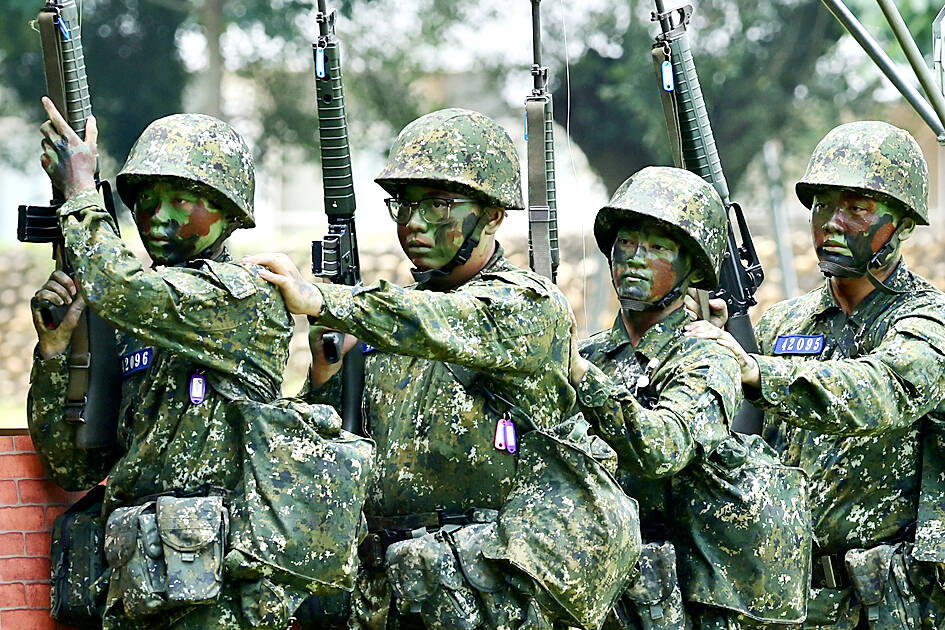The military is set to hold three separate drills involving the army, air force and navy later this month to test the armed forces’ combat readiness, a military source said yesterday.
Starting on Oct. 28, the army is to conduct a brigade-level force-on-force training exercise involving the Armored 586 Brigade of the 10th Army Corps, which is responsible for the defense of central Taiwan, and the 8th Army Corps’ 333 Mechanized Infantry Brigade, based in southern Taiwan.
Running until Nov. 1, one of the major changes to the annual drill codenamed “Chang Tai” (長泰) is that the 19th version would take the form of a non-stop drill over a five-day period. The drill is aimed at testing and training troops across a wider range of scenarios, including nighttime combat.

Photo: Ritchie B. Tongo, EPA-EFE
The 24-hour training format was previously adopted in late July during the Han Kuang military exercises, the nation’s major annual military drills, although the five-day exercise had to be cut short due to Typhoon Gaemi.
Meanwhile, the navy is also scheduled to launch its annual Hai Chiang (海強) exercises some time from the end of this month or early next month, simulating its defensive strategy in case of an invasion headed by Chinese warships, the source said.
Also beginning on Oct. 28 are the air force’s annual Tien Lung (天龍), or “Sky Dragon,” airborne exercises, which test air-to-air, air-to-sea and air-to-ground combat skills.
The air force’s backbone fighters, namely the F-16Vs, Mirage 2000-5s, and Indigenous Defense Fighters, would participate in the five-day exercises to test their joint warfare capabilities, the source added.
As in previous exercises, the air force would select flying aces in different categories through competitions, including aerial combat and precision flying.

FALSE DOCUMENTS? Actor William Liao said he was ‘voluntarily cooperating’ with police after a suspect was accused of helping to produce false medical certificates Police yesterday questioned at least six entertainers amid allegations of evasion of compulsory military service, with Lee Chuan (李銓), a member of boy band Choc7 (超克7), and actor Daniel Chen (陳大天) among those summoned. The New Taipei City District Prosecutors’ Office in January launched an investigation into a group that was allegedly helping men dodge compulsory military service using falsified medical documents. Actor Darren Wang (王大陸) has been accused of being one of the group’s clients. As the investigation expanded, investigators at New Taipei City’s Yonghe Precinct said that other entertainers commissioned the group to obtain false documents. The main suspect, a man surnamed

DEMOGRAPHICS: Robotics is the most promising answer to looming labor woes, the long-term care system and national contingency response, an official said Taiwan is to launch a five-year plan to boost the robotics industry in a bid to address labor shortages stemming from a declining and aging population, the Executive Yuan said yesterday. The government approved the initiative, dubbed the Smart Robotics Industry Promotion Plan, via executive order, senior officials told a post-Cabinet meeting news conference in Taipei. Taiwan’s population decline would strain the economy and the nation’s ability to care for vulnerable and elderly people, said Peter Hong (洪樂文), who heads the National Science and Technology Council’s (NSTC) Department of Engineering and Technologies. Projections show that the proportion of Taiwanese 65 or older would

Democracies must remain united in the face of a shifting geopolitical landscape, former president Tsai Ing-wen (蔡英文) told the Copenhagen Democracy Summit on Tuesday, while emphasizing the importance of Taiwan’s security to the world. “Taiwan’s security is essential to regional stability and to defending democratic values amid mounting authoritarianism,” Tsai said at the annual forum in the Danish capital. Noting a “new geopolitical landscape” in which global trade and security face “uncertainty and unpredictability,” Tsai said that democracies must remain united and be more committed to building up resilience together in the face of challenges. Resilience “allows us to absorb shocks, adapt under

Taiwan Semiconductor Manufacturing Co (TSMC, 台積電) yesterday said it is building nine new advanced wafer manufacturing and packaging factories this year, accelerating its expansion amid strong demand for high-performance computing (HPC) and artificial intelligence (AI) applications. The chipmaker built on average five factories per year from 2021 to last year and three from 2017 to 2020, TSMC vice president of advanced technology and mask engineering T.S. Chang (張宗生) said at the company’s annual technology symposium in Hsinchu City. “We are quickening our pace even faster in 2025. We plan to build nine new factories, including eight wafer fabrication plants and one advanced